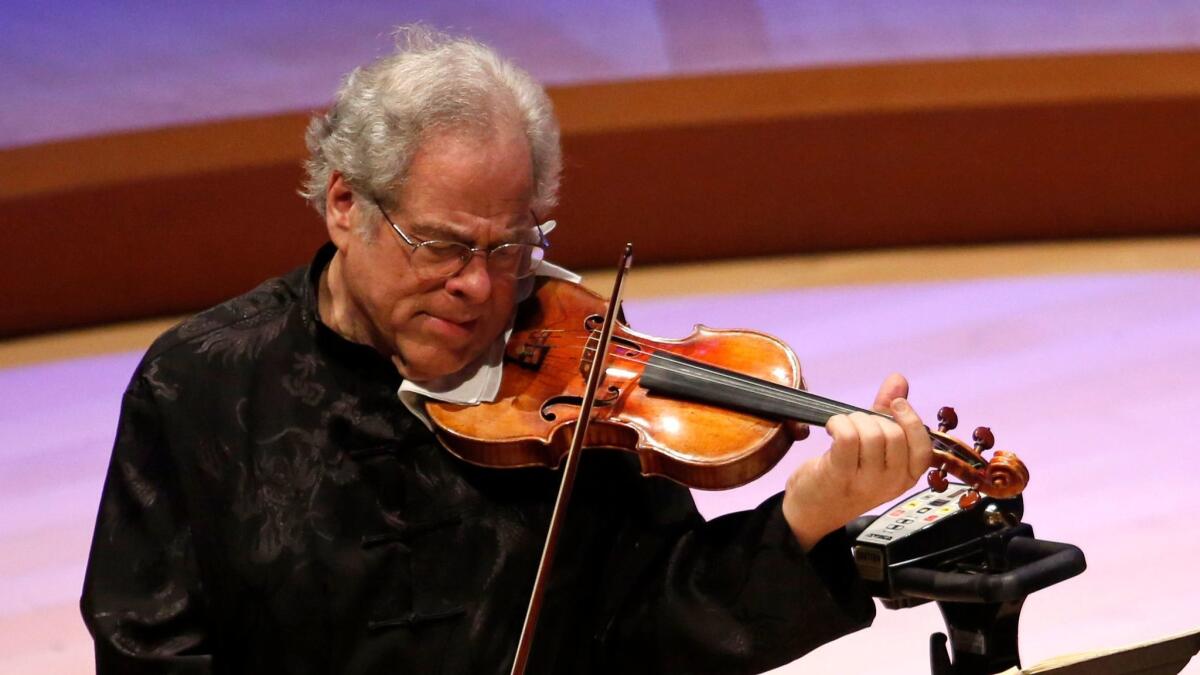Review: Itzhak Perlman does his thing: easy delights for comfortable listening

- Share via
During the grandest deluge that some Southern California cities have seen in years, Itzhak Perlman drew a capacity audience to Segerstrom Concert Hall in Costa Mesa on Sunday to listen to him do essentially the same thing he’s been doing for decades.
Nothing wrong with that. Other classical musicians might learn a thing or two from the 71-year-old Perlman, still one of the biggest stars in an art form that could use a few more.
In this recital for the Philharmonic Society of Orange County (the program is scheduled for repeat Tuesday at Walt Disney Concert Hall), Perlman once again showed himself to be a master of light entertainment. In music of Vivaldi, Beethoven, Schumann and Stravinsky, he never pushed it too hard, even when pushing harder would have made musical sense, opting instead for melodic grace and rhythmic ease, no sweat. He avoided intensity, in other words, which made for comfortable listening.
Perlman is getting to the age when flaws in technique begin to become apparent and when critics start noting them. On Sunday, his intonation was occasionally sketchy, the notes approximated in pitch rather than hit right on. His tone, too, could turn wiry and dry, and he seemed incapable of a true, rich forte. Whether these blemishes — and mere blemishes they were — were due to age is immaterial. People will say they are.
But Perlman minimized flaws. He did it by keeping to a narrow dynamic range and by taking moderate tempos. Everything flowed and duress remained contained. His best playing came in the softer dynamics, when he traced phrases with a subtly perfumed sotto voce.
With pianist Rohan De Silva in colorful and articulate support, Perlman opened with the early Sonata in A (RV 31) by Vivaldi. It didn’t seem like a lot of thought had gone into the reading, and certainly not an inkling of Baroque performance practice was applied. All was melodic and graceful, a nice warm-up.
Beethoven’s Violin Sonata No. 5, “Spring,” came next, in a friendly and leisurely account. Though this is one of the composer’s more genial works, the lack of strong dynamic contrasts in the performance sapped much of the drama of the piece.
Perlman then turned the breathless poetry and Romantic urgency of Schumann’s “Fantasiestücke,” Op. 73, into pleasant song, plumbing neither expressive depths nor summiting ecstatic heights. What he did was not necessarily objectionable, though; there was style and taste here.
After intermission, Stravinsky’s “Suite Italienne” (based on music from “Pulcinella”) was a delightful addition, and the violinist’s sure sense of rhythm made it go down for the most part winningly. Some of its technical demands were dispatched only serviceably, however, and generally the sharp edges of this music went missing.
Then came the part of the recital not to be dismissed, because it helps to explain Perlman’s attraction for the general public. As usual, he took microphone in hand to announce a series of encores. These are pretended to be picked on the spur of the moment from a big pile of pieces brought on stage by the page turner. Perhaps they were. Perlman explained that he had a list in front of him “of everything I’ve played in this neighborhood since 1912,” so that he wouldn’t duplicate anything.
He is a gifted humorist (as with his music making, he doesn’t press) and his banter helps some people feel less threatened by classical music. Not such a bad thing. This afternoon, the encores were three: the “Sicilienne and Rigaudon (in the Style of Francoeur)” by Fritz Kreisler, “Lensky’s Aria” from “Eugene Onegin” transcribed by Leopold Auer, and the “Danse Espagnole” by de Falla — bon bons one and all, a sweet dessert following a light meal.
SIGN UP for the free Essential Arts & Culture newsletter »
Follow The Times’ arts team @culturemonster.
ALSO
With a nod to the L.A. protests, Master Chorale rips into Beethoven’s search for peace amid chaos
In L.A. march, Grand Park performs well with crowds; Metro and Pershing Square, not so much
Los Angeles artists speak out on why they joined the march for women
A free comic offers artist ‘Resist!’-ance at the Hammer Museum
More to Read
The biggest entertainment stories
Get our big stories about Hollywood, film, television, music, arts, culture and more right in your inbox as soon as they publish.
You may occasionally receive promotional content from the Los Angeles Times.










